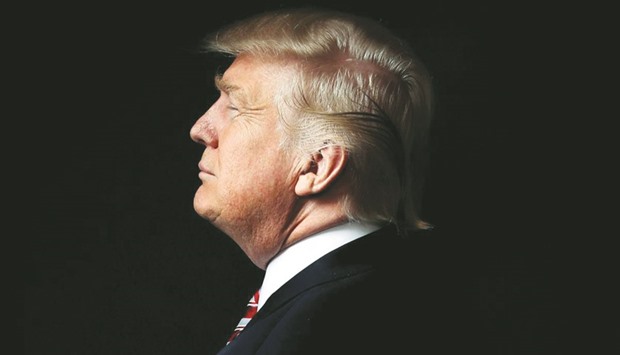Chaos and caprice in the Trump White House — still less than three weeks old — has considerably, shaken and stirred the global geopolitical order. While there was no dearth of doomsday painters even beforehand, The Donald has left America and the world breathless with his trigger-happy executive orders — unabashedly, given to a certain ‘my way or the highway’ cow boyish streak.
Pakistan, like pretty much others elsewhere, is also trying to figure out a ‘survival guide’ for at least the immediate term. What is clear — like the sceptics had then envisaged — is that the famous December call the-then President-Elect Donald Trump engaged in with Prime Minister Nawaz Sharif belongs to the past, already.
Pakistan, Trump reportedly told Sharif then, is a “fantastic” country full of “fantastic” people that he “would love” to visit as president. Sharif was described as a “terrific guy”. He was also reported to have told Sharif, “I am ready and willing to play any role that you want me to play to address and find solutions to the outstanding problems.”
It was panned by critics as one of the earliest indicators of Trump’s inexperience at diplomatic speak (even if it led to indulgent bragging in the media by excited Sharif handlers); back in Washington however, it rebounded scathingly for the former TV reality star.
With a single stroke of a pen, Trump imposed a travel ban on citizens of seven Muslim states within the first week of his astonishing ascendancy to the world’s most prized office — it has since been suspended following a federal judge’s restraining order but whose fate is still in limbo after Trump administration filed an appeal.
Predictably, the ban has raised the spectre of a similar fate awaiting Pakistani travellers (with possibly, stricter restrictions for Pakistani-Americans) after the three-month review of the executive order or down the road — depending on the turn of events.
It has led to an intense debate in both the US — where according to an educated estimate, half a million Pakistan-origin residents live/stay — and Pakistan, centred on their immediate fate as well as the whole gamut of a troubled relationship.
The issue, of course, cannot be taken lightly even if the Trump administration will be hard pressed to go down the route it has with other Muslim majority states. The reason? Pakistani-Americans make a decent population of high achievers, who have contributed a great deal to America’s growth in multiple ways.
According to a Rockefellar Foundation-Aspen Institute Diaspora Program (RAD) June 2015 report, 63 percent of all Pakistani immigrants are US citizens, whose educational attainment levels are noteworthy. “A far greater share of the Pakistani first and second generations earned undergraduate degrees than the US population overall, and individuals in this population are more than twice likely to hold advance degrees. Roughly equal shares of the Pakistani diaspora and the general US population participate in the labour force, and they are likely to work in professional and managerial occupations,” it says.
RAD reveals that 23 percent of the Pakistani diaspora members, aged 25 or above, have a master’s degree, an advanced professional degree, or a PhD, compared to only 11 percent of the US population overall.
The report goes on to add that households headed by a member of the Pakistani diaspora have a median annual income of $60,000, or 10,000 above the median for all US households, and fully 18 percent of Pakistani diaspora households are in the top 10 percent of the US household income distribution.
The report points to how well-positioned the Pakistani diaspora is with “numerous, well-funded and professionally managed organisations throughout the country. These groups take a broad range of forms, including professional and business networks and advocacy organisations.”
Can the Trump administration afford to put more than 5,000 well qualified doctors, and a professional workforce made up of Pakistani-Americans in medicine, aerospace, IT, engineering, academia, research and logistics, to name a few fields, in the wringer for the deranged actions of a few off-kilter individuals in the past?
There are also no easy or ready answers to the vexing question surrounding expanding the travel ban to Pakistan even though some Trump aides appeared to suggest the possibility of a heavy hand and he himself freewheeled about “extreme vetting”.
Initially, White House spokesman Sean Spicer and Chief of Staff Reince Preibus implied that the ban could be expanded (to Pakistan), but since then, there has been relative calm with ambivalent denials. In part, it may have to do with the reality check resulting from robust multiple legal challenges from within the US against the first ban and the empirical need for Trump administration to stay in business with Pakistan, like all its predecessors, for geopolitical reasons even if, for argument’s sake, it was to ride roughshod at home.
The US embassy in Islamabad has emphasised that the visa policy for Pakistan was not being changed and that the Trump administration had not given any exclusive instructions regarding the country.
An embassy spokesperson told Geo, a leading private TV channel, last week that Pakistan was not being considered for a visa ban at the moment and that the visa policy remained the same as it was before Trump assumed office.
Interestingly, General (retired) James Mattis, US Defence Secretary, even before assuming charge had already spoken about the need to stay engaged with Pakistan and, in a broad hint at future policy, suggested incentivising co-operation with Pakistan to achieve US goals.
Aware of this strategic need, Islamabad appears to have decided on a wait-and-see approach, with the Foreign Office going to the extent of terming the Trump administration’s contentious travel ban as Washington’s “sovereign right”.
“It is every country’s sovereign right to decide its immigration policy,” Foreign Office spokesman Nafees Zakaria told a weekly media briefing last week. He however, chimed in with politically correct assertions about “humanitarian” considerations resulting from the travel ban.
But while the belated official reaction understandably, betrays vested interest, Sharif’s ministers have been slightly more forthcoming about the “unfairness” of the executive order for domestic consumption.
* The writer is Community Editor.

SETBACK: US President Donald Trump has run into serious legal challenges over his executive order to slap travel ban.

